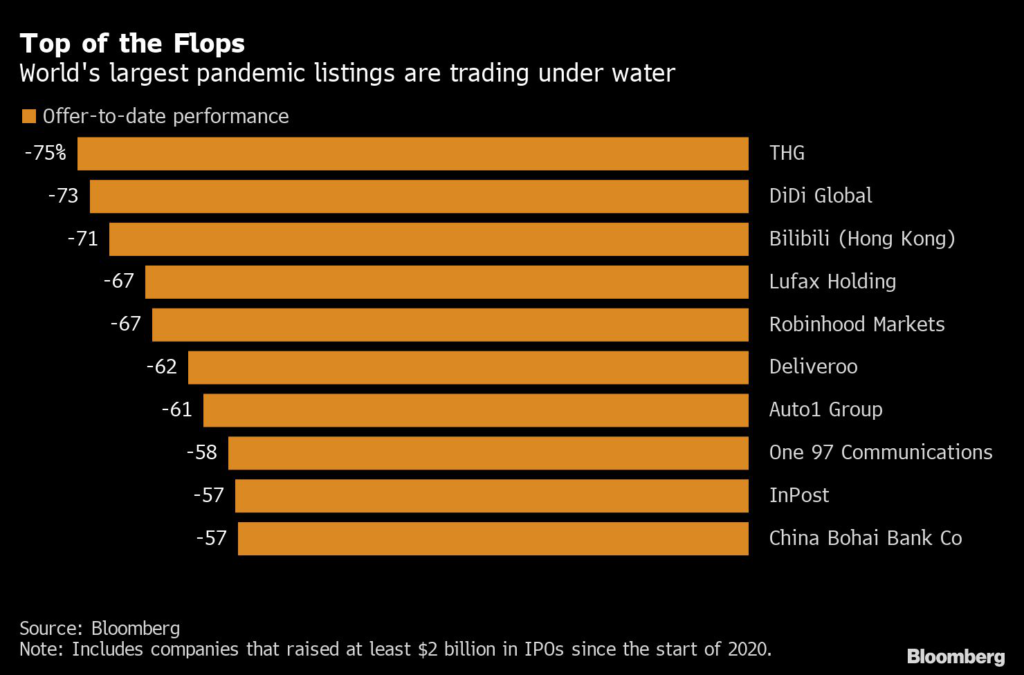(Bloomberg) — Initial public offerings have gotten off to a rough start of the year.
Globally, $26.7 billion worth of IPOs have priced, marking a 60% drop from the same period a year earlier. Now, pulled deals are piling up under pressure from roiling markets.
The prospect of interest rate hikes combined with slowing economic growth and geopolitical tensions have set global equities on course for their worst month since the pandemic started. Frothier technology and growth shares, including recent IPOs, have been particularly vulnerable to the selloff as investors flock to cheaper stocks.
“It’s a really tough environment for new listings right now,” said Andreas Bernstorff, head of European equity capital markets at BNP Paribas SA. “Many investors are grappling with their portfolios turning negative and the rotation into value is depressing appetite for the growth stocks that dominated the IPO market last year.”
The Cboe Volatility Index, a gauge of expected market swings also known as the VIX, has surged 60% this month, a red flag for new share sales.
In New York, the market turmoil has made at least nine firms call off IPOs, including cloud-based human resources platform Justworks Inc. and Four Springs Capital Trust. And the blank-check frenzy that reached a fever pitch in early 2021 has reversed course, with $4 billion worth of special-purpose acquisition company listings scrapped this month.
Read More: SPAC Wipeout Spurs Top Sponsors to Pull IPOs at Record Clip
In Europe, startup WeTransfer pulled its Amsterdam offering on Thursday after it failed to drum up enough investor demand, and a day later German drugmaker Cheplapharm Arzneimittel GmbH put its planned listing on hold. U.K. law firm Mishcon de Reya LLP has delayed what would have been the world’s biggest law firm IPO for a second time, Bloomberg News reported.
Falling investor demand and rocky markets have caused the value of scrapped IPOs to almost double worldwide from a year ago, hitting $6.2 billion so far. Another recent casualty was South Korea’s Hyundai Engineering Co., which pulled its $1 billion listing on Friday after failing to draw demand at the valuation it wanted.
“While the selloff removes some of the froth from the market, and will likely create many opportunities in growth stocks for the long term, it would be a brave decision for a corporate to push for an IPO in the current climate,” said Virginie Maisonneuve, global chief investment officer for equities at Allianz Global Investors.
In Hong Kong, Asia’s busiest listing venue, proceeds are down by more than 40% this year as China’s sweeping regulatory crackdown forces companies to put IPO plans on ice.
Fund managers “have started seeing outflows, which means they’re more focused on repositioning their portfolio rather than buying new issues,” said Fabian De Smet, Berenberg’s global head of equity syndicate. “IPOs have quickly moved from the top to the bottom of their priority list.”
Under Water
The biggest IPOs that had been announced by this time in 2021 came from technology, online services and e-commerce sectors, including TikTok rival Kuaishou Technology in Hong Kong, Polish parcel-locker provider InPost SA and U.S. dating app Bumble Inc.
These companies saw surging demand during lockdowns, but initial gains quickly fizzled as economies reopened. Nine out of last year’s top 10 biggest IPOs are now under water, with ride-hailing company DiDi Global Inc.’s 73% drop since its listing leading the pack. Electric truckmaker Rivian Automotive Inc. has had a dizzying ride, falling 67% from its peak a week after selling shares in November.
And one year after Robinhood Markets Inc. found itself at the center of the meme-stock tempest, the retail brokerage is down 85% from last year’s high, and reported revenue and first-quarter outlook that missed estimates. The company is one of the worst high-profile global stock market debuts since the onset of the pandemic, joining the likes of Didi and London’s THG Plc.
Read More: IPO Stocks in the Red Weigh on Europe’s Start in 2022
With stock markets surging to fresh record highs in 2021, IPO valuations were particularly frothy. But poor post-listing performances and several high-profile flops have made investors more selective.
“Overall, it seems like the market and the appetite will be more muted than it was last year,” said Chi Chan, portfolio manager at Federated Hermes. “The question is, will the market be willing to digest the number of deals at the valuations that they want?”
Pockets of Activity
Still, some markets seem to have escaped the turmoil. South Korea’s LG Energy Solution raised $10.7 billion this month in the country’s biggest-ever IPO and went on to soar almost 70% in its Thursday debut. India is also gearing up for a record listing: State-owned insurer Life Insurance Corp. of India is expected to go public soon in a deal that could value it at as much as $203 billion, Bloomberg News reported.
And IPO markets could bounce back quickly if market swings die down. After a record spike in the VIX Index in March 2020, new deals started coming back just two months later. If listing candidates are mindful of investor caution on pricing, 2022 could turn its rough start around.
“In general, most companies are still moving forward with their IPO plans and could find a window to launch,” said Shi Qi, head of ECM at China International Capital Corp. “As long as the valuation expectation of the issuer is in line with market conditions, I think there is still demand for IPOs.”
More stories like this are available on bloomberg.com
©2022 Bloomberg L.P.











